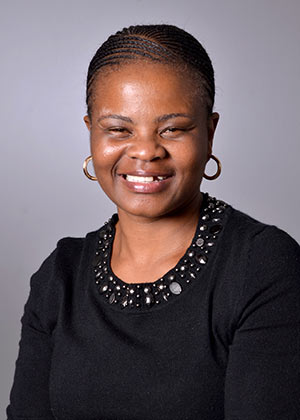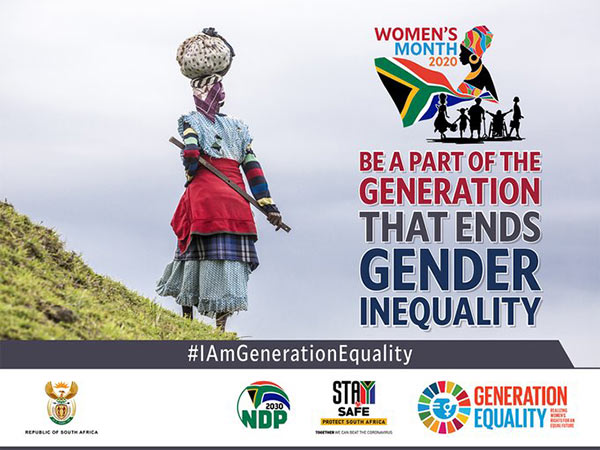

Nozibele Nomdebevana
The College of Graduate Studies (CGS) prides itself on being a pioneer in realising Unisa’s vision of being the African university shaping futures in the service of humanity. CGS is led by women who are warriors in academia, striving to ensure academic freedom and research that impacts on society.
Among these powerful women in leadership is Nozibele Nomdebevana, the Corpus Project Leader and CGS champion for transformation. This is what she had to say about the communal grooming of the leader - mbokodo - she is today:
In my community, leadership skills are embedded in the community’s fundamental values, and to acquire them is an ongoing process that starts during childhood at home. Such values are strictly and subtly instilled in children in general, on a daily basis, but with special emphasis on the eldest daughters, oomafungwashe (as the isiXhosa language designates them) and the eldest sons, iinkulu, to build responsible future leaders in the form of mothers and fathers. This upbringing prepares them not only to take over as caregivers to their siblings when their parents are no more, but to become responsible future leaders in general. Being the eldest child means huge indigenous leadership responsibility. Hence, we are nurtured with communal indigenous values so that we can pass them on to our children and many generations to come.
As umafungwashe at home, from a very young age, I used to take care of my siblings in various ways. This responsibility unconsciously pushed me to uphold my community values. I was not perfect, but through reprimands and approval from my parents, I steadily improved. As a result, I became a role model to my siblings, a reliable daughter to my parents and my community, and at school level, I was selected as a prefect.
In addition to this background, my academic and working experiences taught me to value the people around me and to provide them with the necessary support as well as the respect they deserve. By virtue of being a woman, ordained to carry and bring life to earth, women are entrusted with the task of nurturing and protecting all human lives, including the lives of those they are leading. To women, whose actions are grounded in healthy fundamental communal values, leading with ubuntu becomes natural. Therefore, as long as they live, they have the huge responsibility to protect and nurture those lives. My dream is to see many good leaders produced as a result of my leadership.
The fact that, against all odds, I managed to progress in my academic journey thus far, indicates that I am also motivated by challenges. I am content and proud of what I have sweat for and achieved so far. Hence, I am encouraged to do more. To contribute towards building a healthy humankind, I must use the skills I obtained from home, my community, women of integrity, my role models, my academic achievements as well as my working experience.
To champion transformation at CGS is to advocate internal fundamental change towards developing civic-minded graduates grounded in the African philosophy and epistemology - a calibre of professionals who, after graduating, will go beyond being competent for the job market, but who are also cultured towards addressing the injustices and inequalities that the continent had endured. In a democratic country like South Africa, such professionals play a crucial role.
Since CGS’s mandate is to equip postgraduate students with research and innovation skills, drivers of transformation should galvanise CGS to nurture a quality of researchers that can produce analyses and responses to legitimate concerns that confront humanity on the African continent. At CGS, we are advocates of the African philosophy which entails service to humanity, democratic engagements, autonomy and freedom. This begins with advocates of transformation themselves, as well as academics and administration at CGS that fully understand the state of the South African higher learning institutions prior to 1994 and transform them. As Annie Hoppers once suggested, we need to reboot and rewire ourselves in order to be competent nurturers. And, finally, as Mahatma Gandhi said, we need to be the change we want to see.
* Interview by Mpho Moloele, PR and Communications Assistant, Department of Research, Innovation, and Commercialisation

Publish date: 2020-08-13 00:00:00.0